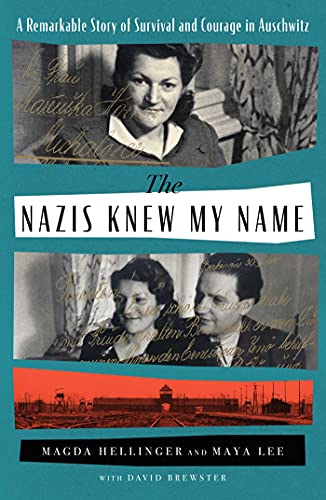
The Nazis Knew My Name
by Magda Hellinger
"A Remarkable Story of Survival and Courage in Auschwitz"
Popularity
4.53 / 5
* A book's popularity is determined by how it compares to all other books on this website.
Where to buy?
Buy from Amazon* If you buy this book through the link above, we may receive a small commission at no extra cost to you.
The Nazis Knew My Name by Magda Hellinger
Details
War:
World War II
Perspective:
Prisoners of War
True Story:
Yes
Biography:
Yes
Region:
Europe
Page Count:
320
Published Date:
2022
ISBN13:
9781982181222
Description
Brief Summary (no spoilers)
The Nazis Knew My Name by Magda Hellinger is a poignant memoir set during the harrowing times of World War II. The book details Hellinger's personal experiences after being deported at the age of 25 from her hometown in Slovakia to a concentration camp. The narrative focuses on her unique role as a Jewish prisoner selected for leadership within the camp. Assigned to manage her fellow detainees, Magda faced the daunting challenge of protecting lives in a perilous environment, all while navigating the treacherous dynamics imposed by the Nazi guards. Her story is one of resilience, courage, and the moral complexities faced by those thrust into positions of imposed authority during one of history's darkest periods.
Main Themes and Topics
The book delves into several significant themes, primarily the moral ambiguities and ethical dilemmas confronted by prisoners appointed to leadership roles in concentration camps. Magda Hellinger's narrative emphasizes the psychological and moral tightrope she was forced to walk, striving to help her fellow detainees while maintaining her precarious standing with the Nazi overseers. Other themes include the strength of human spirit, survival against overwhelming odds, and the impact of small acts of defiance and humanity in the face of systemic brutality.
Writing Style and Tone
Magda Hellinger’s writing style in The Nazis Knew My Name is direct and evocative, providing readers with a vivid portrayal of life within a concentration camp. Her tone is both reflective and candid, capturing the tragic and often paradoxical circumstances she and many others endured. The narrative is composed with empathy and introspection, offering a personal lens through which the broader historical atrocities of the Holocaust are examined. Hellinger's prose manages to balance the stark realities of camp life with moments of hope and the indomitable spirit of those she chronicles.
Awards and Recognition
While specific awards for The Nazis Knew My Name are not mentioned, the book has been noted for its significant contribution to Holocaust literature. It stands out for providing a rare perspective on the roles of Jewish prisoner leaders in concentration camps, a subject less frequently covered in mainstream Holocaust narratives.
Criticism
Some readers may find the book's focus on the leadership dynamics within concentration camps challenging, as it presents a nuanced view of the complex interrelations between captor and captive. While offering critical insights, this perspective might appear controversial to those more accustomed to traditional Holocaust narratives that emphasize clear-cut distinctions between oppressor and victim. Nonetheless, Hellinger's memoir has been commended for its honesty and the depth of its personal reflections.




![The Tattooist of Auschwitz [Movie-Tie-In]](https://m.media-amazon.com/images/I/51oBZ7tuzeL._SL500_.jpg)




